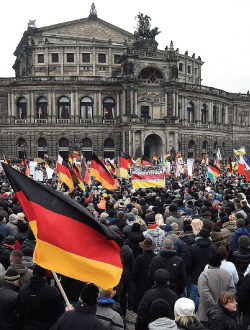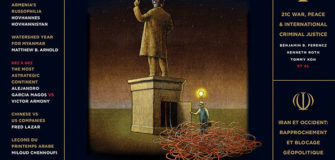“In 2020, Western multiculturalism will…

Phil Triadafilopoulos
…be alive and well. Despite its denigration in the statements of European political leaders, the trend has been toward the extension, entrenchment and adaptation of multiculturalism in liberal-democratic states in Western Europe, North America and Oceania. Queen’s University academics Keith Banting and Will Kymlicka have noted that multiculturalism policies have endured and proliferated, even in states whose leaders have criticized multiculturalism: their Multiculturalism Policy Index, a measure of multiculturalism policies across a wide array of countries and over time, provides ample evidence in support of their position. Others have arrived at the same conclusion through their research. For instance, my ongoing work on the provision of publicly funded religious education to Muslims demonstrates that even countries with very tenuous multicultural pasts, such as Germany, have made significant strides in equalizing access to benefits long reserved for members of a society’s majority. German states such as Lower Saxony, Hesse and North Rhine-Westphalia have developed innovative means of extending religious instruction in public schools, long reserved for Catholic, Protestant and Jewish students, to their Muslim classmates. At the federal level, Germany has followed the lead of other European countries, including staunchly republican France, in fostering the development of Muslim corporate bodies intended to foster dialogue between representatives of Muslim communities and representatives of the state.
These and other changes have been driven by immigration. At its heart, multiculturalism is about recognizing that societies have become more diverse and need to reconsider and, when necessary, revise longstanding institutions – best understood as the formal and informal rules of social interaction that shape everyday life. Unsurprisingly, these reconsiderations and revisions of longstanding rules of the game have elicited friction – manifested most spectacularly in the popularity of anti-immigration/anti-Islam movements and parties such as PEGIDA in Germany and Golden Dawn in Greece. Change has therefore come haltingly and through differing means – sometimes through modifications to regulations, sometimes through new laws, and at other times through the courts. Yet changes have occurred and will continue to occur.
The impetus for continuing change will also vary. In some instances, courts will lead, extending old constitutional rights to resolve new debates. In other instances, change will come through the ballot box, as the electoral weight of newcomers grows and the lure of wedge politics and anti-immigration populism fades. Here it is worth highlighting Chancellor Angela Merkel’s robust criticism of PEGIDA and ongoing efforts to have the CDU compete more effectively for support in Germany’s diverse urban centres. While rearguard actions on the part of anti-immigration movements and parties will persist – drawing energy from the murderous violence perpetrated by fanatics (who, it should be noted, also reject multiculturalism) – these actors will diminish in importance as larger and more consequential parties compete more actively for support from a more diverse citizenry. While the trajectory will be uneven and will likely include some steps backward, it will be consistent and, because of the weight of demography and the transformative effect of constitutional principles, undeniable.”
» Phil Triadafilopoulos is Associate Professor of Political Science at the University of Toronto Scarborough and the School of Public Policy and Governance. He is the author of Becoming Multicultural: Immigration and the Politics of Membership in Canada and Germany (UBC Press, 2012).
John R. Bowen
… be accepted as the nature of contemporary society, whatever the particular national ways of governing and supporting it, and whether or not it makes one happy. Each of Canada, France, Germany and other countries will maintain its own traditions of civic life, but these countries will converge on the realities of immigration, of Islam as a domestic religion, and of visible diversity as part of everyday life. Freedom of religion will be even more strongly defended. The older debates – should Germany naturalize Turks? Is Islam part of Sweden? – will be settled for the leadership of each country.
But underneath this cross-national convergence on the realities of multiculturalism, currents of anti-Semitism, Islamophobia and racism of all stripes will continue to thrive. Racism in its broad sense has been part of Western life for centuries; it will not be easily scrubbed away. It will change its major targets. In the EU, racism will target not so much the increasingly integrated citizens whose ancestries lay in former colonies and allies (Pakistan, India, Algeria, and Turkey), but rather the recent, quite traumatized arrivals from turbulent parts of central and western Africa. It will also turn on the marginal populations of Europe, and in particular the Roma. In the US, of course, the major challenge will continue to be breaking the lock of spatial segregation on patterns of everyday life.
Indeed, the banalization of multiculturalism as a fact of life will mean that it will recede as a term of art – except perhaps in Canada where it will remain a plank of national policy. More critical will be the debates over social justice, economic mobility, and individual rights, including religious rights.”
» John R. Bowen is Dunbar-Van Cleve Professor in Arts & Sciences at Washington University in St Louis, and author of Why the French Don’t Like Headscarves (Princeton University Press, 2007), and Blaming Islam (The MIT Press, 2012).
Michael Barutciski
… be largely discredited. Its idealized, extreme form will be seen as contrary to national interests.
As it becomes increasingly apparent that the strongest Western promoters of multiculturalism spend little time studying other cultures, languages and geography, the superficial aspects of the idea will contribute to its loss of favour even among those attracted to the tolerance and understanding it encourages.
The best attempts to salvage the idea will emphasize cohesion and common values as we see in the «interculturalisme» variant adopted in Québec. Integration will, quite understandably, become an explicit expectation for immigrant groups, who will be discouraged from forming ghettos. As this mild shift from rights to responsibilities comes to add nuance to the potentially explosive question of immigrant integration, the practices in other cultures around the world will attract more attention and open imaginations. The coexistence of diverse cultures in non-Western places will then offer more modest variations and alternatives with richer histories than the brash self-promoting model currently popular in places like Canada (generally).
In 2020, Western multiculturalism will have lost its superficial political appeal among most Europeans, who will instead try to formulate more sophisticated approaches to their complex integration problems. The idea will have been generally rejected, except in parts of Canada, where people will keep making boastful (and nonsensical) claims like “Toronto is the most multicultural city in the world” – that is, simply equating the term ‘multicultural’ with having immigrants from every country. The model has an important place in intellectual thought, but it would be foolish to govern international migration in the name of a theory.”
» Michael Barutciski is Associate Editor of Global Brief and Graduate Program Director and Associate Professor in the Glendon School of Public and International Affairs, York University (Toronto).
Tariq Modood
…be an even more significant feature of political debate and controversy than it is today. Cultural difference – especially ethno-religious difference – will continue to play out in political battlegrounds, particularly across most of Western Europe.
By 2020, the idea that post-immigration émigrés will no longer be labelled as ‘Blacks,’ ‘Asians,’ ‘Hispanics’ or ‘Muslims’ due to their full integration will have been debunked. In fact, such alienating labels will continue to grow and harden in an anti-diversity climate. Such a climate of fear and hostility will only reinforce negative perceptions of these groups.
By 2020, the new frontier of multiculturalism will be about rethinking political secularism and the boundary between private and public religion. Encouraging and resourcing linguistic, cultural and sub-state national identities – not to mention gender and sexual orientation – while excluding religious identities from public and political space, will be seen as secularist prejudice. This will further underline the notion that liberal, difference-blind integration by itself is not an adequate or comprehensive strategy to realize deep-rooted multiculturalism. The kind of cosmopolitan individualism that is hostile to national identities is similarly inadequate to the task.
The politics of cultural difference will be even more prominent in 2020 than is the case today. There are really only two options ahead of us: a version of monocultural nationalism or a multiculturalist remaking of national citizenship.”
» Tariq Modood is the founding Director of the University of Bristol research Centre for the Study of Ethnicity and Citizenship. His extensive writings on multiculturalism can be accessed from his website: http://tariqmodood.com.












